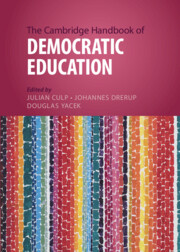Book contents
- The Cambridge Handbook of Democratic Education
- Cambridge Handbooks in Education
- The Cambridge Handbook of Democratic Education
- Copyright page
- Contents
- Contributors
- Acknowledgments
- Introduction
- Part One Historical Perspectives
- Part Two Philosophical and Normative Foundations
- Part Three Key Topics and Concepts
- Part Four Challenges
- 26 Wealth Stratification in US Higher Education and Democratic Education, 1890s–2020s
- 27 Mentoring and Instructional Duties of Professors
- 28 Racism, Moral Transformation, and Democratic Education
- 29 Postcolonial Perspectives on Democratic Education
- 30 Populist Challenges to Democratic Education
- 31 Religion and Democratic Education
- 32 The Epistocratic Challenge to Democratic Education
- 33 Climate Change and Democratic Education
- 34 The COVID-19 Pandemic and Democratic Education
- 35 Teacher Neutrality, Pedagogical Impartiality, and Democratic Education
- Index
- References
30 - Populist Challenges to Democratic Education
from Part Four - Challenges
Published online by Cambridge University Press: 20 April 2023
- The Cambridge Handbook of Democratic Education
- Cambridge Handbooks in Education
- The Cambridge Handbook of Democratic Education
- Copyright page
- Contents
- Contributors
- Acknowledgments
- Introduction
- Part One Historical Perspectives
- Part Two Philosophical and Normative Foundations
- Part Three Key Topics and Concepts
- Part Four Challenges
- 26 Wealth Stratification in US Higher Education and Democratic Education, 1890s–2020s
- 27 Mentoring and Instructional Duties of Professors
- 28 Racism, Moral Transformation, and Democratic Education
- 29 Postcolonial Perspectives on Democratic Education
- 30 Populist Challenges to Democratic Education
- 31 Religion and Democratic Education
- 32 The Epistocratic Challenge to Democratic Education
- 33 Climate Change and Democratic Education
- 34 The COVID-19 Pandemic and Democratic Education
- 35 Teacher Neutrality, Pedagogical Impartiality, and Democratic Education
- Index
- References
Summary
“Populism” is a much used but still rather vague term employed mostly in political but also in educational discourses. To understand what is meant by “populist challenges to democratic education” this chapter first analyzes the historical relations between liberal democracy and public education. I then refer to a discussion of “populism” using a social-political definition of the term that was coined by American sociologist Edward Shils. This is followed by a discussion of populist changes in public discourse and education created by new media. My main focus is on the populist challenges to systems education systems and the challenges of populist positions in education itself. Finally, I will suggest the perspectives that remain for democratic education.
- Type
- Chapter
- Information
- The Cambridge Handbook of Democratic Education , pp. 512 - 530Publisher: Cambridge University PressPrint publication year: 2023



